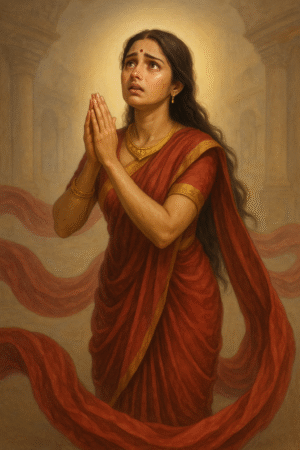"Panchali: The Fire-Born Queen Who Changed Destiny"
Among the shimmering tales of Indian mythology, few figures shine as brightly — and as tragically — as Panchali, better known as Draupadi. Born from fire, destined for greatness and suffering alike, Draupadi is one of the most complex heroines of the Mahabharata. Over the centuries, countless myths, retellings, and interpretations have added new layers to her legend.
Let’s explore her story and some of the fascinating myths surrounding this enigmatic queen.

A Birth from Fire
Draupadi’s story begins not in a royal nursery but within the sacred flames of a yagna (sacrificial ritual). King Drupada of Panchala, desperate for a son to avenge his humiliation by Dronacharya, performed a great fire-sacrifice. From the flames emerged not only a mighty son, Dhrishtadyumna, but also a stunningly beautiful daughter — Draupadi.
Dark-skinned, radiant, and fierce, Draupadi was no ordinary princess. She was named Yajnaseni (daughter of the fire ritual) and Panchali (princess of Panchala). Even from birth, destiny marked her for greatness — and for trials few could endure.
The Myth of Five Husbands
One of the most talked-about and controversial aspects of Draupadi’s life is her marriage to the five Pandava brothers — Yudhishthira, Bhima, Arjuna, Nakula, and Sahadeva.
The story goes that Arjuna won her hand in a swayamvara (a ceremony where a princess chose her husband among assembled suitors). When he returned home with Draupadi, he called out to his mother Kunti, “Look what I have brought!” Without seeing her, Kunti instructed, “Share it equally among yourselves,” thinking it was alms. Bound by maternal command and divine destiny, Draupadi became the wife of all five brothers.
But mythology offers a deeper layer: it is said that in a previous birth, Draupadi prayed to Lord Shiva for a husband with five qualities — wisdom, strength, archery skills, handsome appearance, and patience. Since no single man could embody all five qualities, she was granted five husbands in her next life.
The Myth of the Game of Dice
Perhaps the most harrowing moment in Draupadi’s life was the infamous game of dice, where she was gambled away by Yudhishthira and humiliated in the Kaurava court. Dushasana attempted to disrobe her in public, but by divine grace, her sari became endless, protecting her honor.
Some traditions believe that Draupadi herself invoked Lord Krishna with a silent prayer, while others say her inner spiritual power caused the miracle. This moment marks her transformation from a queen into a force of vengeance, vowing that she would not tie her hair until it was washed with Dushasana’s blood.
Her humiliation became the moral catalyst that eventually led to the great war of Kurukshetra.
Draupadi as an Avatar
In some regional tellings, Draupadi is considered an avatar of Goddess Kali or Adi Shakti, embodying divine feminine energy. Her fiery temper, her unbending will, and her relentless demand for justice are seen as expressions of cosmic power.
In Tamil Nadu and Karnataka, Draupadi is worshipped as a village deity, and grand festivals celebrate her story in dramatic folk performances called Draupadi Amman Kootthu.
A Woman Ahead of Her Time
Despite the hardships she faced, Draupadi stands as a symbol of dignity, strength, and rebellion. She questioned authority — asking pointed questions in the court of Hastinapura. She defied the norms — living as the wife of five men when even a second marriage was frowned upon. And she demanded justice — not just for herself, but for all women wronged by society.
Panchali’s story is not just an ancient tale; it’s a timeless reminder of courage in the face of humiliation and injustice.
Conclusion: A Flame That Never Died
Despite the hardships she faced, Draupadi stands as a symbol of dignity, strength, and rebellion. She questioned authority — asking pointed questions in the court of Hastinapura. She defied the norms — living as the wife of five men when even a second marriage was frowned upon. And she demanded justice — not just for herself, but for all women wronged by society.
Panchali’s story is not just an ancient tale; it’s a timeless reminder of courage in the face of humiliation and injustice.
